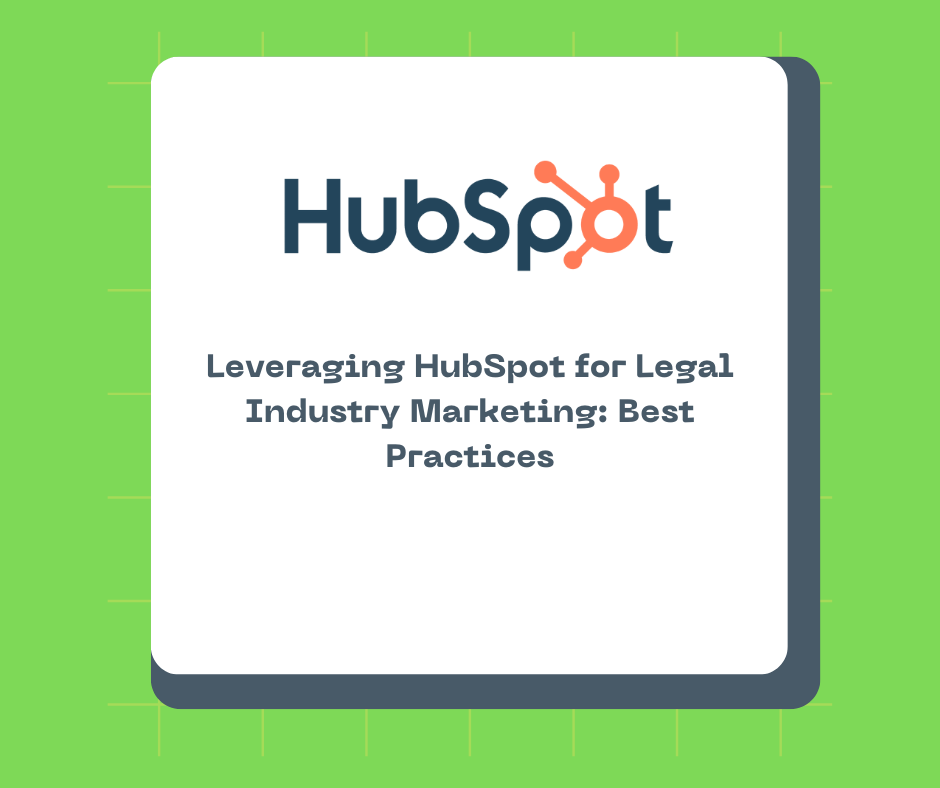In the modern legal landscape, effective marketing has become an indispensable tool for law firms and legal professionals to distinguish themselves, attract clients, and foster growth. With the proliferation of digital channels and the evolving preferences of consumers, leveraging robust marketing automation platforms has become essential. HubSpot, renowned for its comprehensive suite of marketing tools, offers tailored solutions to empower the legal industry in navigating the complexities of marketing effectively. In this article, we'll delve into the best practices for leveraging HubSpot in legal industry marketing, enabling law firms and professionals to maximize their reach, engage clients, and drive success.
Understanding the Unique Challenges of Legal Industry Marketing:
The legal industry presents a unique set of challenges and considerations for marketing professionals. Unlike traditional consumer goods or services, legal services are often intangible and complex, requiring a nuanced approach to marketing. Moreover, legal professionals must adhere to strict regulations and ethical standards governing advertising and client solicitation. In this context, leveraging technology and automation tools becomes imperative for legal firms to streamline marketing efforts while maintaining compliance and professionalism.
Leveraging HubSpot's Features for Legal Industry Marketing:
HubSpot offers a range of features and tools tailored to the needs of the legal industry, enabling firms and professionals to execute effective marketing strategies. Let's explore some best practices for leveraging HubSpot in legal industry marketing:
-
Content Marketing and Thought Leadership: Content marketing plays a pivotal role in establishing credibility and thought leadership in the legal industry. HubSpot's content creation and management tools empower legal professionals to develop high-quality, informative content that educates and engages their target audience. From blog posts and articles to whitepapers and webinars, legal firms can leverage HubSpot to showcase their expertise, address common legal issues, and provide valuable insights to potential clients.
-
Email Marketing and Client Communication: Email marketing remains a powerful tool for legal firms to nurture relationships with clients and prospects. HubSpot's email marketing features enable firms to create personalized, targeted email campaigns that deliver relevant content and updates to subscribers. By segmenting email lists based on factors such as practice area, client type, and engagement level, legal professionals can ensure that their communications resonate with recipients and drive engagement.
-
CRM Integration and Client Relationship Management: Effective client relationship management is essential for legal firms to retain clients, drive referrals, and maximize client satisfaction. HubSpot's CRM platform provides a centralized system for managing client interactions, tracking leads, and automating follow-up processes. By integrating HubSpot's CRM with their marketing efforts, legal firms can gain valuable insights into client preferences, track the effectiveness of marketing campaigns, and deliver personalized experiences that foster loyalty and trust.
-
Lead Generation and Conversion Optimization: Generating leads and converting them into clients is a primary objective for legal marketing efforts. HubSpot's lead generation tools enable legal professionals to capture leads through forms, landing pages, and gated content. By offering valuable resources such as legal guides, eBooks, and case studies, firms can attract potential clients and nurture them through the sales funnel. HubSpot's conversion optimization features, including A/B testing and optimization tools, allow firms to continuously refine their marketing strategies and maximize conversion rates.
-
Analytics and Performance Tracking: Measuring the effectiveness of marketing efforts is crucial for optimizing strategies and allocating resources effectively. HubSpot's analytics and reporting tools provide legal firms with valuable insights into campaign performance, client engagement, and ROI. By tracking metrics such as website traffic, email open rates, and client conversions, firms can identify trends, assess the impact of marketing initiatives, and make data-driven decisions to drive business growth.
Conclusion:
In an increasingly competitive legal landscape, leveraging technology and automation tools is essential for legal firms to stay ahead of the curve and attract clients effectively. HubSpot offers a comprehensive suite of marketing tools tailored to the unique needs of the legal industry, empowering firms and professionals to execute effective marketing strategies while maintaining compliance and professionalism. By adopting best practices and leveraging HubSpot's features for content marketing, email automation, CRM integration, lead generation, and analytics, legal firms can enhance their visibility, engage clients, and drive sustainable growth in the digital age.
Schedule your training session here and comment “Need Training” on the request form.

Comments